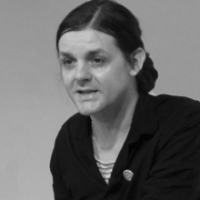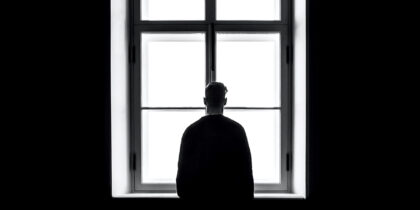
By Mark Brown
Sometimes we all need someone on our side, so why do so many people with mental health difficulties find themselves completely alone in distressing situations?
We all have moments where we feel totally and completely alone and overwhelmed, times when we wish we had someone with us who had our back and could say the words that stick in our throats or who have the knowledge, skills and authority to push back against decisions and situations we know are wrong for us. Someone who has power to challenge power used against us.
The experience of mental health difficulty often generates situations where people find themselves isolated, alone and without anyone to which they might turn. The standard advice is to reach out for help and advice but what if the thing you need is someone to actually be there with you and have your back? What if it’s systems and process that are intended to be benevolent which are actually the problem? What if someone else’s idea of what’s best for you is actually what’s worst and no one will listen to you?
Astrid was 17 when she was admitted to a privately run young person’s unit for her mental health. “I was in tears, I was so terrified when my parents had to leave me that I stayed in my room and cried. I was having panic attack after panic attack and paralysed with fear due to my delusions and voices I could hear. There was screaming on the ward I still remember, and I was so scared and lonely for the first night.” More alone than she had ever been, disorientated and already in distress, it was only a fellow patient who reached out: “A 13 year old girl slid a note under my door telling me her room number and just to knock if I wanted to talk or wanted company.”
What if the thing you need is someone to actually be there with you and have your back?
Empowering individuals is often seen as the primary goal of mental health, situating ‘having your voice heard’ as the aim of advice and support. The assumption is that autonomy and personal competency achieved by advice, coaching or information is the aim of mental health support. This ignores the three ways mental health difficulty might create inequality. Mental health difficulty can take away the organisation, confidence or focus needed to represent yourself fully in the moment to those making decisions around you. Attitudes toward those who experience mental health difficulty can mean that your needs as an individual can be ignored, overlooked or put down to your mental state and discounted. Mental health difficulty is a common experience but not all experiences that result from mental health difficulty are widely recognised. People who experience mental health difficulty may find that issues relating to their mental health could become a point of contention in almost any area of their lives and it is often the case that they as individuals are identified as the problem, rather than the situation in which they find themselves.
“I felt like I was drowning in emptiness,” Astrid told me, “this need for someone to talk to you and see you as a human being who’s struggling, not just a high risk/low risk door room number. They didn’t take me or my symptoms seriously and they didn’t understand what I was going through. Because I wasn’t actively attempting to harm myself, they refused to let a nurse stay with me to talk to me or calm me down. I wasn’t a high enough risk patient so none of the nurses or doctors would listen and stay with me. I felt vulnerable and unsafe in an environment that was supposed to make me feel secure. My symptoms got worse. I just needed another human being with me. Only two nurses in my whole stay truly took the time to listen otherwise, it was up to us patients to look after each other.”
this need for someone to talk to you and see you as a human being who’s struggling, not just a high risk/low risk door room number
A couple of years on, Astrid is reflective about her experience. “It taught me how much people need each other and how to be sensitive to situations and to talk to those struggling, but I feel like that lesson could have been learnt in an alternative less terrifying way. It’s left me with a lot of trauma which is still in the process of being resolved. When you feel so in danger and so terrified, you don’t ever forget that moment. The NHS works hard and I’m grateful for it, but it has understaffed hospitals and underpaid workers.” For Astrid, it was little acts of kindness that were important, being seen and heard and treated as important. “It’s not a lot we’re asking for,” she says, “just for a friend.”
“Having the security that I wasn’t on my own would have helped to keep me calm”
Not all experiences of feeling alone and isolated because of your mental health are so obvious. There are many situations where the experience of mental health difficulty can set someone at odds with the world, or where the problems that result of mental health difficulty, if not properly understood by those with institutional power, can leave someone at a severe disadvantage. Having someone who can support, advise and help to put the case for your needs when you find it difficult or impossible can be invaluable. But it is rare. In England and Wales, everyone who is detained under the Mental Health Act is legally required to have an Independent Mental Health Act Advocate who explains their rights while in hospital. The Independent Review of the Mental Health Act recommends extending both their responsibilities and their availability, moving them to actually representing and supporting over simply advising, and extending the obligation to provide them for voluntary patients and those on community treatment orders. However, life with a mental health difficulty is more than just being in hospital. And out in the rest of people’s lives, a trusted advocate who can support you when your mental health causes you problems is hard to find.
Last year, Lizzy was experiencing medium to severe depression and anxiety. She’d been working for her local authority employers for over thirteen years. She’d done the right things and made her employers aware of her difficulties. In May that year she forwarded a letter to her line manager and Human Resources department from mental health services advising she was living with “severe levels of psychological distress”, but she didn’t hear anything back. In early July, out of the blue, towards the end of the working day, she was called to a meeting with her line manager and an HR representative in the public foyer of the building she worked in. “My poorly brain kicked in, I freaked out and walked out of my job,” she says. “Having watched the CCTV footage I can see myself being more agitated before I freak out; get up and tell them ‘no I’m not doing this.’ I then left, got my things and never went back. I was signed off for my notice period by my doctor. If I’d had some support in the meeting I wouldn’t have walked out, I’d have not freaked out, I’m still shocked I wasn’t even offered the option as they were well aware of my mental health situation and ignored it.”
Having someone who can support, advise and help to put the case for your needs when you find it difficult or impossible can be invaluable.
Lizzy’s former employers were aware of her mental health situation, but didn’t give her an opportunity to prepare for the meeting. “A lot of my anxiety is about the unexpected, being unprepared,” she says, “so being confronted like that was already a bad start. If I’d been able to take someone with me, I think just having the security that I wasn’t on my own would have helped to keep me calm, to feel like someone was on my side. I wasn’t a union member but normally I would have been able to take either a union rep or a fellow employee with me. I wasn’t given this option. This was raised with them and their argument was they didn’t have time to advise me before the meeting that the meeting was going to happen. Normally this would have been made available to me as an option but for some reason I still don’t understand I wasn’t given the option. Something that was seen as a minor meeting by my employers was handled very badly.”
“If I’d had someone there, not to talk for me or to say anything, just to be there to keep me calm, I think the outcome would have been very different,” says Lizzy. “I first advised them I was struggling and seeking medical help at the beginning of last year. A little thought beforehand could have saved a huge amount of upset, I may still even be working there. If I had another illness or a disability then there may have been more attention paid as to how best to accommodate that.” In Lizzy’s case, the lack of consideration that she might have wanted or needed another person with her was the problem. But for others, it’s someone with very specific mental health knowledge that is needed.
“Ignorance not malice”
Cheryl is a professional in her forties. She was a victim of a serious assault. “I was due to attend two days of video interviews,” she told me. “I was allocated an independent sexual violence advisor [ISVA]. The ISVA was allocated from the county in which I live. The ISVA was supposed to be my support, attending police interviews and court with me. She could only support me in the county I live in and therefore could not attend any interviews with me. The police promised to look into getting me an ISVA from their county but didn’t.” Cheryl experiences Post Traumatic Stress Disorder and went into the video interviews without support. “The interviewing officer stopped the video as she was worried about me. She said I was having trouble answering questions and I had gone off into my own world. They called my friend to collect and take me home. They didn’t tell me that they had called an ambulance to assess me. That was a shock and triggered some bad memories. I refused to go to the ambulance and walked away saying I needed some headspace.”
From there, the situation spiralled out of control. “The police officer kept following me. I kept asking her not to follow as it freaked me out and to let me have a walk and clear my head. She didn’t. She blocked my path back so I started to go through a private driveway to a field.” Cheryl was “rugby tackled to the floor” and physically restrained. “I was screaming for her to let me go and not to hurt me,” she says. “That is really when I wish I had someone there to explain that their physical contact with me was triggering me and to see if giving me space helped. Instead more police were called and I was restrained and surrounded by police which made me more upset.”
That is really when I wish I had someone there to explain that their physical contact with me was triggering me and to see if giving me space helped.
Cheryl doesn’t feel there was any malice in the actions of the police, but that doesn’t remove the damage caused. “I think as a result of ignorance as to my condition, as opposed to malice, they were heavy handed,” she says, “and made things worse for me despite their protests that they were acting in my best interests. Following that incident my PTSD symptoms increased and I was admitted to a hospital voluntarily and I am still struggling now. The investigation is on hold and I am now more distrustful of police and my flashbacks are now a mix of the original assault and being pinned down by the police.”
“I wish I had someone who the police regarded as a professional with me during the interview and in the immediate aftermath,” says Cheryl. “That professional would have had mental health experience and knowledge of PTSD, and in particular how to help the police understand and appreciate my symptoms and triggers. I say it should have been a professional otherwise the police would not listen at all to third parties that they didn’t in some way respect.”
Being without witness is a terrible kind of aloneness
The views and experiences of people who live with mental health difficulty have throughout history been devalued in favour of those who have trained to provide care and treatment. Even when we feel we are doing otherwise, we often by instinct err toward respecting the expert opinion of mental health professionals over the lived experience of those who receive their care. Despite much talk in mental health about the rights of patients, often what happens in mental health happens between two people, one of whom works for a large organisation and the other who does not. In such situations, one person alone can even doubt their own experience of poor care. Being without witness is a terrible kind of aloneness.
Rebecca is in her twenties and is keenly aware of the imbalance of power between mental health patients and mental health professionals. “I had a Care Coordinator who told me, who had anorexia and was losing weight, to ‘walk my anxiety off’. I’ve had a Care Coordinator believe I was diagnosed with Borderline Personality Disorder because apparently it was written in my notes – despite never having an assessment for it, never being told I was diagnosed with it, and never actually having it. I had a psychologist who said some things which led to a formal complaint – but then they couldn’t officially discipline her as it was her word against mine.”
Says Rebecca: “I think that often mental health staff forget the reality of the situation, and how much power they really do hold. They forget that after an appointment they just carry on with their day, but that we go home to try to live on with our thoughts. They go back to colleagues whereas we might be going back to a silent house.”
Rebecca firmly feels the power imbalance of being a patient, alone within a system that by default assumes that its actions are benign. She told me about “those times when as someone with a poorly brain, you don’t have the confidence or cognitive ability to get your point of view or thoughts across, and you just need some back up. With staff I trust, I’m happy to be in a room alone with them – there are some who I’m happy to have in my house. With others, I wish I could ask for an advocate to come with me. Because I don’t trust them. Being in a room one to one with someone to discuss your life is really, really scary. I think that perhaps we forget how vulnerable mental health patients can be. If a healthy person went to the doctor and didn’t agree with the treatment offered they’d probably say so, just not do it, switch doctors. But when you’re poorly you don’t value yourself or have enough confidence to do any of that. Your illness tells you it’s all your fault; you’re not trying hard enough. But many people forget that, so those without lived experience probably wouldn’t see how there would be any more need for an advocate in a mental illness interaction than in going to the GP with a chest infection.”
…times when as someone with a poorly brain, you don’t have the confidence or cognitive ability to get your point of view or thoughts across, and you just need some back up… I wish I could ask for an advocate to come with me.
“Whenever I’ve met with the eating disorder nurse around here, I’ve wished I had someone with me,” says Rebecca. “She’s often been unfair, frequently made stuff worse, and has left me absolutely distraught on numerous occasions. My old flatmate had never seen me so distressed as after appointments with her. She didn’t listen, frequently blamed me for things, and was always very brusque. She was unreliable. She was usually late and often finished appointments early. She would cut off my sentences. She would try and fit me into a box rather than listening to what was really going on for me. She wouldn’t work with me while my Mum was unwell, at one point discharged me from her care due to not progressing. Six months later I was in hospital. She’s broken confidentiality more than once. Lots of health professionals know how bad she is but she’s still in her job.”
Rebecca feels that advocacy in general hasn’t ever really featured strongly around mental health. Services are keen on “independence and responsibility which sometimes can be detrimental,” she says, “I don’t think it’s something we’ve lost. I think it’s something we’ve never had. The only exception is when patients are sectioned. Then they’re offered an advocate. But I asked for an advocate once when I was inpatient and going through a complaint and they told me they only had that for patients on a section and that I’d have to approach local charities or find my own if I wanted one.” And there’s the challenge: where would we find someone who could advocate for us, act as trusted witness and ensure that our needs and rights are respected?
If we care about justice, we need advocates for advocacy
Advice and advocacy are vital for recourse to justice for people who experience injustices where they are excluded by circumstance, attitudes, and legal and other practices from having their natural rights regarded. When people with mental health difficulties have problems, often they are not experts in the area in which their problem occurs. We may not know whether anyone else has ever experienced this thing that is happening to us, and eventually end up accepting the organisation’s/service’s view of the situation or incident which is causing us difficulty.
An advocate can be anyone who stands with us in the moment. Astrid’s experience of intense isolation and lack of power to control what was happening serves as a wider metaphor for the experience of many. ‘We will do to you and you will accept because you are mentally ill’ is still all too common, as much in mental health services as in other areas of life.
Mental health difficulty can make it difficult to argue your case and have your case heard. An advocate can argue your case when you cannot. An advocate, through seeing others in similar situations, can provide an overview that a person alone in crisis cannot. An advocate can be an expert in the rights of individuals and communities and the obligations, rules and laws which govern the conduct of institutions, companies and individuals. More than that, an advocate can be a witness, a sounding board and an ally. An advocate is there for you, not the people or structures that cause you problems. All of these things are vital in redressing the power imbalance that prejudice, discrimination, convention, outdated law and the actual moment-to-moment reality of living with mental ill-health and distress creates. As the people who spoke to me illustrate, even having someone who is on your side present in difficult conditions of power imbalance might make all the difference.
An advocate is there for you, not the people or structures that cause you problems. All of these things are vital in redressing the power imbalance that prejudice, discrimination, convention, outdated law and the actual moment-to-moment reality of living with mental ill-health and distress creates.
Advocacy in mental health is not widely discussed, in part because justice in mental health is not widely discussed. In the UK at least, the notion is that improving systems, organisations and ‘awareness’ will resolve people’s issues. The idea of peer support in mental health, in part, began with organisations such as the Mental Patients Union undertaking to support people and each other in meetings and dealings with ‘the system’. But this version of peer support has floundered, over time accepting that the only possibility for change was to join ‘the system’ rather than standing apart from it and with the people for whom it caused harm. Law Centres and Citizens Advice are often reticent to become involved in people’s situations where mental health plays a significant role. Where they have, such as in the case of benefits decisions, the effect has been startling. One group of legal volunteers in 2015 succeeded in overturning 95% of Work Capability Assessment ‘fit to work’ decisions.
Funding for advocacy for people with mental health difficulties is next to non-existent and will remain so until we are advocates for its importance. We can’t tell people who are experiencing real harm and discrimination that things will be better once we reach the promised land where all law, institutions, bodies and individuals treat people with mental health difficulties as they should. We should applaud the recommendation of the Independent Mental Health Act Review for the extension of the duties and role of independent mental health advocates and push for their proper funding (NSUN, 2018). But that doesn’t go far enough. People with mental health difficulties need well-resourced, knowledgeable independent advocacy and advice across all kinds of life situations. As I said elsewhere, the answer to ‘Who you gonna call?’ in mental health is often ‘There’s no one.” The problems caused by mental health difficulty are too often experienced alone and that is wrong. If we care about justice for people with mental health difficulties, we need to put advocacy back on the agenda.
Names have been changed by request.
These pieces are part of our writer in residence programme, and are the writer’s personal views.











